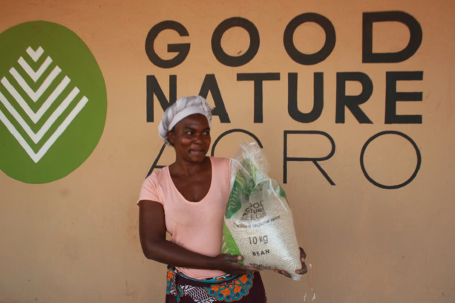Authors: Roberta Bove, Kellan Hays, Stella Nordhagen, Ellie Turner
Investing in companies that support nutritious food value chains could be a triple win for farmers’ livelihoods, their nutrition, and that of the end consumers of their products – but how do we know it actually works? Over the past few months, the Nutritious Foods Financing Facility (N3F) has been working with our first few investees and the leading impact-measurement specialist 60 Decibels to try and find out.
N3F is a nutrition impact-first fund launched by the Global Alliance for Improved Nutrition (GAIN) and Incofin, in partnership with the U.S. Agency for International Development (USAID) and the Swiss Agency for Development and Cooperation (SDC). N3F directly finances small and medium enterprises (SMEs) that contribute to positive nutrition outcomes along food and agricultural value chains, serving mainly lower-income consumers in domestic markets in Sub-Saharan Africa. This financing is intended to support the SMEs’ efforts to increase the availability, accessibility, affordability, safety and consumption of their products.
GAIN leads the N3F fund’s nutrition impact monitoring, focusing on key outputs in the theory of change, as reviewed under USAID Advancing nutrition, (i.e., the direct results of the N3F's work) using annual data collection from on investees, aligned to IRIS+ standard indicators where feasible.
To complement this firm self-reported data, GAIN is collaborating with 60 Decibels to conduct lean surveys to gain actionable data, where possible and useful, on the SMEs’ target clients (e.g., farmers or consumers). This data will provide insights on who the investee firms reach in terms of demographics and income levels, as well as how they are affected by that.
Preparing for this was a multi-year journey. The standard 60 Decibels’ Lean Data approach, as successfully implemented in the agriculture, microfinance, and off-grid energy sectors, relies on access to databases of firm customers, who are then interviewed via brief phone calls. This approach, however, is rarely applicable to nutritious food SMEs: as these products are often sold through markets, not direct-to-consumer, most SMEs do not know their end consumers or their contact details. To test other ways to reach them, GAIN and 60 Decibels ran pilot surveys on three SMEs in 2021, and successfully used stickers on products and radio ads as approaches to reach customers.
Once the N3F fund was launched in 2024, GAIN and 60 Decibels built on the lessons learned from the pilot and continued to fine-tune the approach for gathering nutrition impact insights by:
● Addressing various target groups, depending on the SME’s business model (i.e., customers for producers of nutritious foods or farmers for SMEs operating as input providers);
● Tailoring the 60 Decibels’ survey by including for the first time nutrition-specific questions, such as on diet diversity, to gather nutrition impact insights;
● Disaggregating data by gender and age brackets, to learn who within the household consumes the nutritious food products and with what frequency, including with a focus on children;
● Piloting in-person interceptions at point of sale, as an alternative to stickers and radio ads in cases of a lack of contact details.
One of the first partner investees in the work was Good Nature Agro (GNA), an innovative Zambian SME specialized in legume seeds and commodities, partnering with over 15,000 smallholder farmers. N3F’s investment in Good Nature Agro aims at contributing to increased access to quality bean and groundnut seeds for smallholder farmers, and to the resulting beans and groundnuts for Zambian households for consumption.
As we were considering the impact-measurement approach for GNA, one of the key insights was that farmers might benefit not only by using the seed for planting but also from using it as food for their families. In this way, GNA might be improving not only livelihoods but also nutrition. So, we decided to focus on their farmer-clients – and include survey questions about those households’ own consumption of the GNA products.

Source: Good Nature Agro
We completed the baseline survey of 275 Zambian farmers in October 2024, and the highlights included that:
1) GNA provides a unique and highly valued service to low-income and vulnerable farmers, with 92% of farmers supported by GNA living on less than $3.65 a day, compared to a national average of 73%;
2) GNA farmers experience benefits as a result, particularly in crop production and income, with 70% of interviewed farmers reporting an increase in total production, and 36% reporting a large increase;
3) For 33% of consuming households, beans and groundnuts likely contributed to increasing dietary diversity within the household, representing a food group that was otherwise not a part of their meals on that day;
4) 68% of farmers said their quality of life was improved by collaborating with GNA – and education support to children was among the top three self-reported outcomes for this.
These results were highly encouraging, and we’re looking forward to following the evolution of GNA in subsequent surveys. The survey results, particularly the last unexpected insight on education impact on children, also reaffirmed for us that investing in agriculture and nutrition can help improve children's lives. N3F aims to be intentional about being a child-inclusive fund going forward, according to the UNICEF Child-Lens Investing Framework. Impact measurement will be a key part of our strategy for doing that: N3F plans to pilot a child-lens survey module, co-developed by 60 Decibels and UNICEF, during 2025. This module will help N3Fbegin to integrate child lens principles into its investments, starting with its impact monitoring practices. Impact is central to impact investment – and we’re proud to be getting an end-user view on it through this partnership.